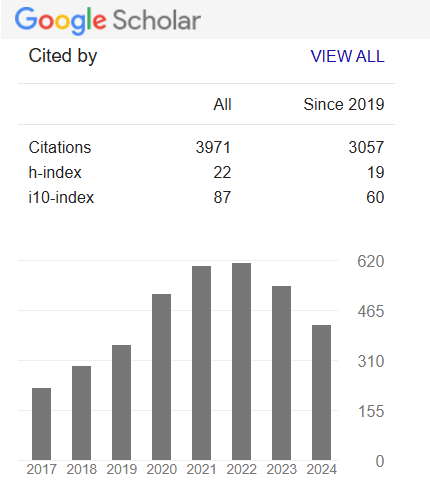Effect of blended fertilizer application on yield, nutrient and protein content of sorghum (sorghum bicolor (l.) moench) varieties under rainfed condition in north western Tigray, Ethiopia
Abstract
Sorghum (sorghum bicolar (L.)Moench) is an important cereal crop, which requires high dose of nutrient for optimum growth and productivity. Even though it is highly adapted to different agro ecology, its yield is constrained by declining soil fertility due to nutrient depletion, low level of fertilizer use and unblended application of fertilizer. An experiment was conducted in Shire-mytsebri Agricultural Research Center; at Sheraro sub site in north western Tigray, Ethiopia, during the main cropping season of 2016 with the aim of to evaluate the effects of blended fertilizers on yield, protein yield and nutrient concentration (%) of (N, P, K) of selected sorghum varieties. The treatments comprised factorial combination of ten levels of fertilizers (N, P, Blanket recommendation (NP), NPK, NPS, NPKS, NPKSZn, NPKSZnB, NPKSZnB (ATA) and Control (0)) and two sorghum varieties (Melkam and Dekeba) tested in a Factorial Randomized Block Design (RCBD) with three replications. A data of grain and biomass yield, nutrient concentration (N, P and K) and protein yield were taken. There was significant interaction effect of fertilizer treatments and sorghum varieties on most of parameters of the studied. Significantly higher grain yield (5541kgha-1) was obtained in Melkam treated by NPKSZn. Higher Biomass yield was obtained from Melkam treated by NPK (21087kgha-1). Application of blended fertilizer significantly enhanced Nutrient concentration and protein yield. The highest protein yield (251kg/hr) and nutrient concentration (%) of (N, P, K) (0.7247, 0.5163 and 0.5769kg ha-1 respectively) was recorded for Melkam variety treated with NPKSZn. The result showed the application of micronutrient-enriched NPK fertilizers improved the nutritional quality by increasing the quantity of protein and concentration of micronutrients of the harvested grains. Thus, taking the findings of the present study showed that farmers can use a blended fertilizer containing NPKSZn to improve nutritional quality and grain yield of sorghum.
Keywords: blended fertilizer, nutrient concentration, protein yield, sorghum, Ethiopia
Downloads
Additional Files
Published
How to Cite
Issue
Section
License
Copyright (c) 2020 Redai Weldegebriel

This work is licensed under a Creative Commons Attribution-NonCommercial-NoDerivatives 4.0 International License.
Open Access This article is licensed under a Creative Commons Attribution 4.0 International License, which permits use, sharing, adaptation, distribution and reproduction in any medium or format, as long as you give appropriate credit to the original author(s) and the source, provide a link to the Creative Commons license, and indicate if changes were made. The images or other third party material in this article are included in the article’s Creative Commons license unless indicated otherwise in a credit line to the material. If the material is not included in the article’s Creative Commons license and your intended use is not permitted by statutory regulation or exceeds the permitted use, you will need to obtain permission directly from the copyright holder. To view a copy of this license, visit http://creativecommons.org/ licenses/by/4.0/











